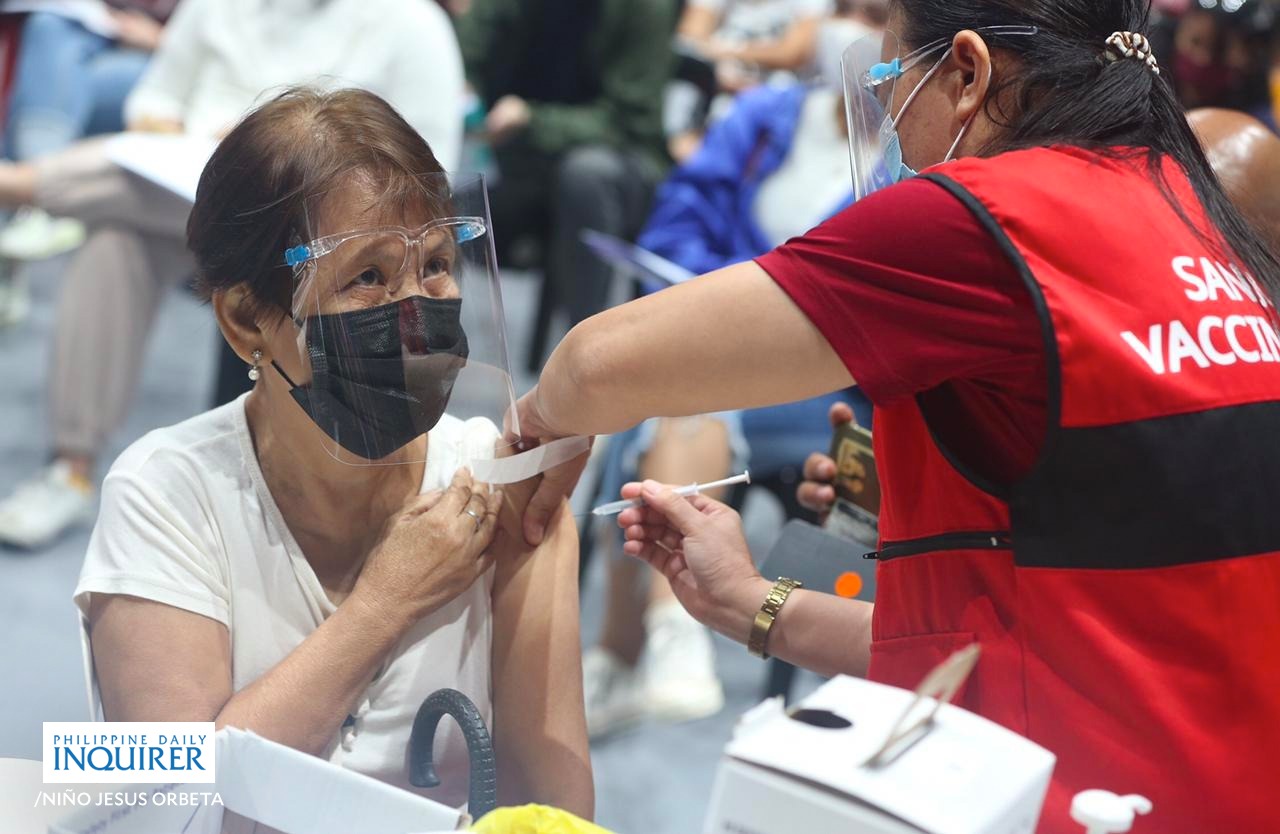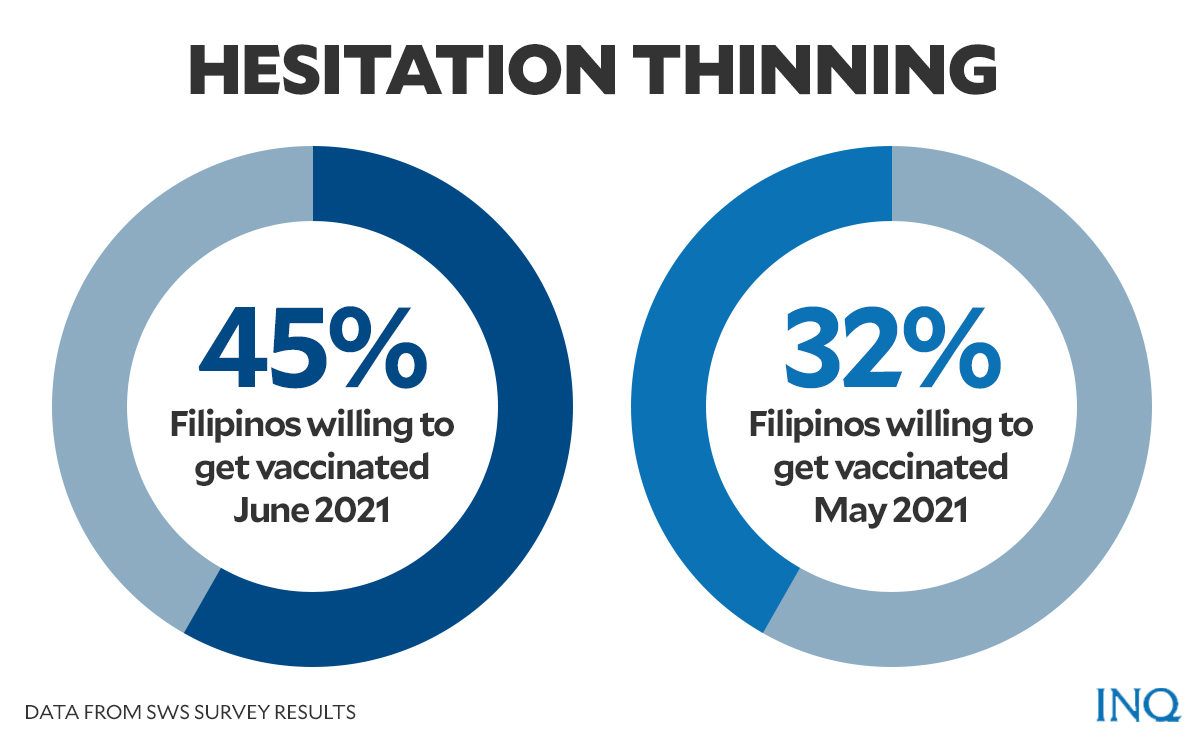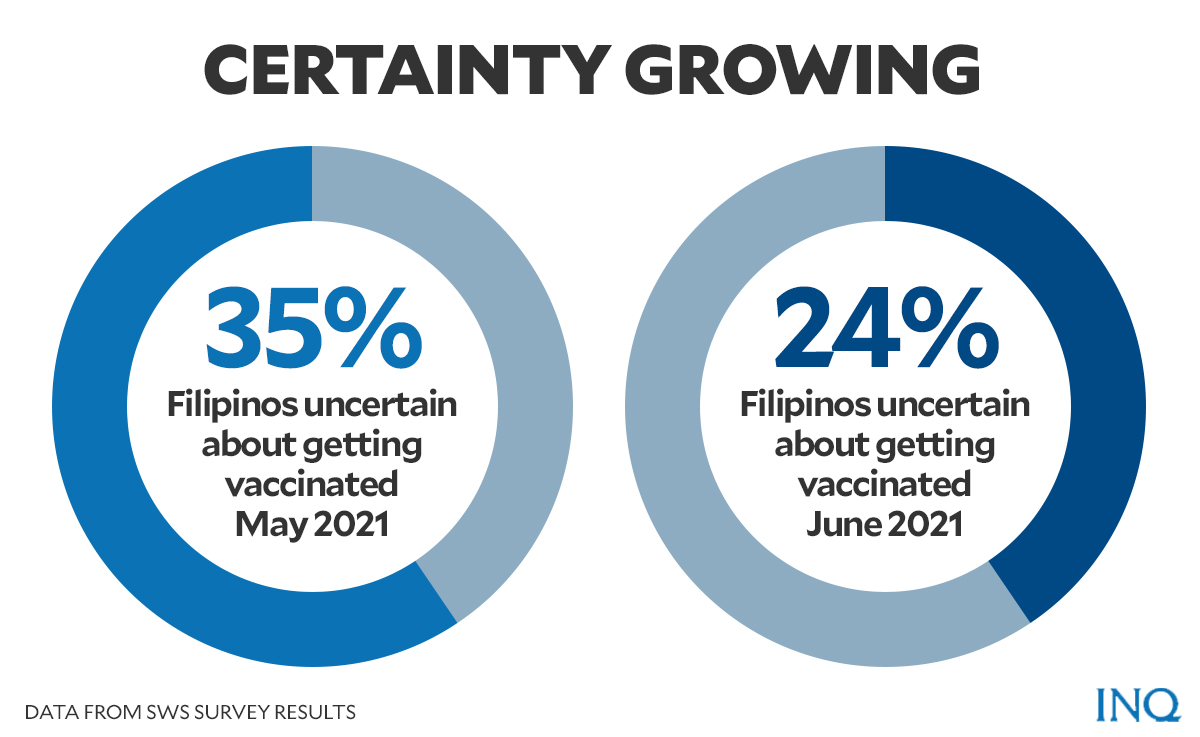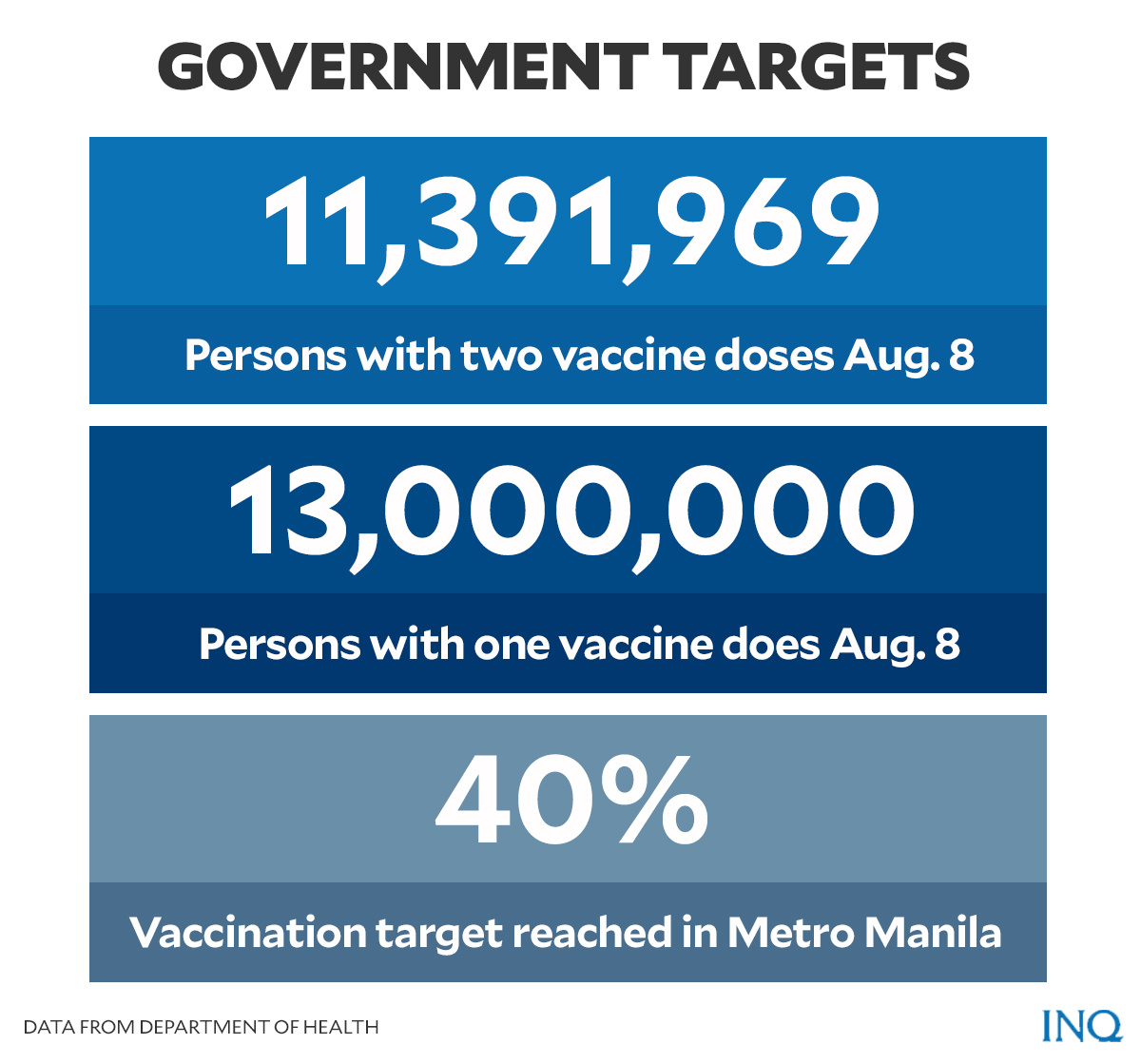Thousands now flocking to vaccine sites. What next?

SAN JUAN CITY residents receive a single dose of Janssen vaccines on July 21. FILE PHOTO/NIÑO JESUS ORBETA
MANILA, Philippines—The coronavirus vaccination fiasco in Manila and Las Piñas last week could have been driven by one of three factors or a combination of those—fear of arrest as President Rodrigo Duterte had warned, impact of fake news thriving on social media, and a growing acceptance among the people of vaccines as a way out of the pandemic.
Latest data from the Department of Health (DOH) backed the third notion, as figures for fully vaccinated Filipinos breached the 11 million mark.
Still, the country’s vaccination program is still stuck in a sticky situation as people continued to storm vaccination centers and faced difficulties in registration amid the new round of enhanced community quarantine (ECQ) in Metro Manila.
Positive turn?
Whether the thousands of Filipinos who flocked vaccination sites in several parts of Metro Manila on Thursday (Aug. 5) in the middle of curfew hours panicked because of fake news, rumors, or reckless statements by authorities, it was highly possible that people’s perception of vaccines has changed from hesitancy to acceptance.
READ: Social media scourge shows as thousands flock to vaccine sites
READ: Reckless statements behind jab panic: If that ‘somebody’ is Duterte
While there are still people who hesitate getting injected, some factors had encouraged more people to get vaccinated against SARS Cov2, the virus causing COVID-19, and its more transmissible variants.
Article continues after this advertisementBefore the panic, results of a Social Weather Stations (SWS) survey released last June said around 45 percent of Filipinos were now willing to get vaccinated.
Article continues after this advertisementThis is higher than numbers from results of SWS survey in May, which showed only 32 percent of Filipinos were willing to be injected.
The percentage of respondents who are uncertain also dropped, from 35 percent in May to 24 percent by June.
READ: More Filipinos willing to get COVID-19 vaccine, latest SWS survey shows
This willingness to get injected with vaccine doses, regardless of what’s driving it, was reflected in recent data released by the DOH.
As of Aug. 8, the health department reported a total of 11,391,969 individuals have received two vaccine doses while over 13 million individuals have received at least one dose.
READ: DOH: Over 11.3M Filipinos fully vaccinated vs COVID-19
According to Health Secretary Francisco Duque III, at least 40 percent of the 10 million target injections in Metro Manila have been hit.
READ: Metro Manila nears 40% of target for herd immunity — Duque
Despite the high vaccination statistics, however, more difficulties are making it tougher for Filipinos to get their vaccine shots.
Registration process
Initial investigation by the Manila Police District (MPD) found that some individuals who rushed to the vaccination centers last week said they had no idea about the online registration requirement.
The Manila City government previously offered walk-in vaccinations for the public—even for non-residents and non-workers in the capital city—but still required online registration.
Following the panic and in consideration of ECQ, the city government of Manila stopped accepting walk-in vaccine hopefuls.
“Walk-ins are no longer allowed in pursuant to the policy imposed by the national government amid the imposed ECQ in the city,” a Manila City Hall advisory read.
“Barangay officials will distribute stubs to individuals who are scheduled to get vaccinated,” it added.
Those who want to be vaccinated in Manila can visit https://manilacovid19vaccine.com and click the “register or reserve” button. Fill up the registration form and click “validate,” enter the one-time password that will be sent through your cell phone and click register.
Then click the “I agree” button and affix your signature on the waiver page.
In an advisory, the city of Las Pinas likewise said it would no longer allow queues in vaccination sites during curfew hours or between 8 p.m. to 4 a.m.
In a separate statement, the city government said that the vaccination will resume during enhanced community quarantine from Aug. 6 to 20.
However, only those who register online and have secured their patient ID number and QR code will be accommodated.
The city government said only senior citizens are allowed to line up for vaccines without the QR code. It said those wanting to get inoculated should register at bit.ly/LasPiñasVaccination.
Online registration is required, not only in those two cities, but in the entire Metro Manila.
Each city government has an online website where residents can register and schedule their vaccination.
Most, if not all, of the registration processes per city require personal details like phone number, age, address, medical history.
Some cities ask for a valid ID and a 1×1 picture on white background.
READ: LIST: Online registration forms of Metro Manila cities for COVID-19 vaccination
https://www.facebook.com/QCGov/photos/623856325668795
Suggested system
To keep up with increasing demand from the public who are willing to get vaccinated—as well as to help give more people protection against COVID—a health expert suggested several solutions.
Former government health adviser Dr. Tony Leachon, in a tweet posted on Monday (August 9), said the country must aim to vaccinate more people within the “soonest time possible and with least wastage.”
“Let’s push for more vaccination sites, and longer schedules, if possible 24 hours, to minimize crowding,” he said.
“These crowded vaccination centers could be causing super spreading events,” he added.
Leachon’s suggestions have already been considered by some, while others have already started implementing them.
To add more vaccination sites, the government has recently tapped Catholic churches as vaccination sites during ECQ in Metro Manila.
At least 30 churches in Caloocan, Malabon, and Navotas were offered for use as vaccination sites by Bishop Pablo Virgilio David, one of the Church leaders considered as a critic of the Duterte administration.
READ: Churches tapped as vaccination sites; minors next in line
Last week, the Philippine Red Cross (PRC) has opened its COVID vaccination center on Edsa corner Boni Avenue to speed up the injection of Metro Manila residents.
https://www.facebook.com/phredcross/posts/6619003524791667
Based on data presented by NTF Against COVID-19 Chief Implementer and Vaccine Czar Secretary Carlito Galvez Jr. on Monday, there are a total of 4,497 vaccination sites in the country.
Manila has recently opened three 24/7 vaccination sites in Tondo, Sampaloc, and Pandacan, which will help administer doses to members of the A1, A2, A3 and A5 priority groups.
The city also offers drive-thru vaccination at the Quirino Grandstand.
READ: Manila opens drive-thru COVID-19 vaccination site at Quirino Grandstand
Follow a strategy, criteria
Due to cases of Delta variant among the unvaccinated population in the country, the national government and health experts have begun discussing the urgency of vaccinating people below 18 years old.
READ: 83 of 450 Delta cases in PH were unvaccinated vs COVID-19, says DOH
READ: Gov’t mulls over adjusting vaccination target to 80 percent
“That is also a subject of review and consideration by our vaccine expert panel and also the expert group,” said Duque in an interview with ANC.
“And I, for one, wouldn’t mind that we should already start vaccinating children for as long as first, we prioritize which among the children,” Duque said.
He said priority still should be those with comorbidity, or other diseases that make COVID deadlier. He cited a report from Philippine General Hospital that said six children are in serious condition because of COVID and two of them had comorbidity.
Leachon said the Duterte administration should focus on a strategy before proceeding with vaccination of children.
“The parents of those children should be vaccinated first since they are the ones who are working in order to feed and pay for the child’s education,” Leachon said speaking in Filipino during his Facebook live stream late Monday.
“Right now, if I would decide, let’s wait first for the larger chunk of our population [to be vaccinated],” he said.
“The children will not go out for work or school yet anyway even if we vaccinate them now,” he added.
The doctor emphasized that vaccination for A1, A2, A3, and A4 priority groups should come first before students or children get their doses.
“For now, we shouldn’t vaccinate the younger population yet since we have inadequate [vaccine doses], but we should still think about it,” Leachon explained.
“Though the children need it [vaccination against COVID-19], there’s a timing for it,” he added.
He also shared a set of criteria, which he said could be helpful in deciding where the vaccines will go and who will receive them.
These include:
- Most COVID-19 cases and higher reproduction number
- Density of the population
- Contributions to the economy
- Availability of cold chain facilities
- Ease of administration
- Quick herd immunity to reopen the economy
Practice safety protocols
While many Filipinos wait for their turn to get vaccinated, Leachon said the best way to fight infection is still to heed basic health protocols, especially now that the Delta variant is making its presence felt.
“There is no vaccine that is 100 percent effective,” he said.
“That is why it is still very important that all of us should maintain minimum health standards and protocols,” he added.
TSB
RELATED STORY:
A growing concern at PGH: COVID-hit kids
For more news about the novel coronavirus click here.
What you need to know about Coronavirus.
For more information on COVID-19, call the DOH Hotline: (02) 86517800 local 1149/1150.
The Inquirer Foundation supports our healthcare frontliners and is still accepting cash donations to be deposited at Banco de Oro (BDO) current account #007960018860 or donate through PayMaya using this link.


